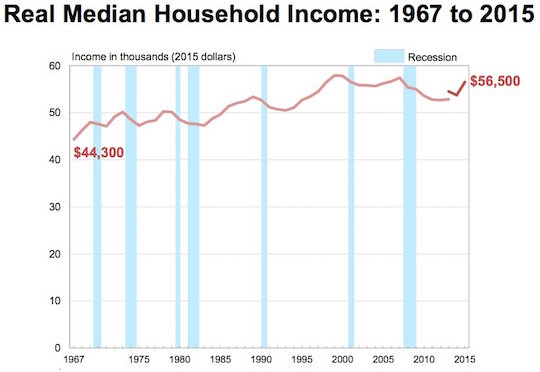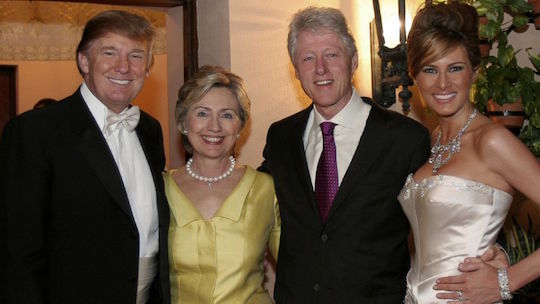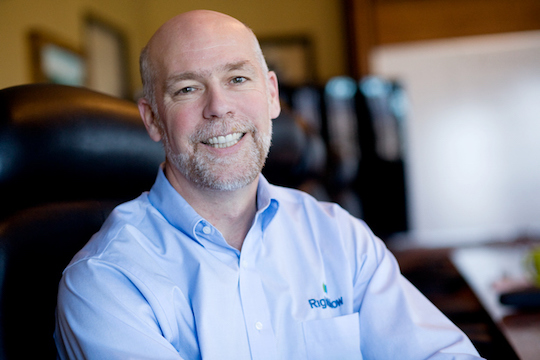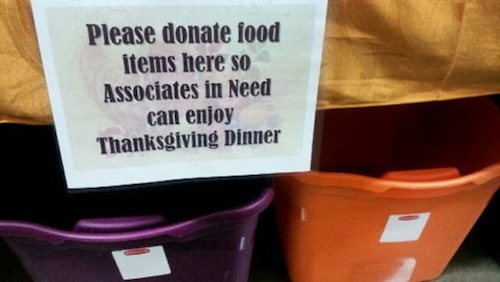The median income of an American household increased 5.2 percent in 2015, the largest single-year increase since 1967. The poverty rate also fell, and the portion of Americans without health insurance fell to about 10 percent. That’s good news, especially during a recovery whose benefits have disproportionately gone to the very rich and large corporations. The bad news is in the graph above. You will notice that median incomes have risen after the each of the seven recessions of the last 50 years except for two: the last two. Although the historical trend has been for incomes to exceed or at least return to their pre-recession levels during each recovery, the median income is still lower than it was in 2007 or, for that matter, 1998.
Tag Archives: wages
Ways to lose to Trump: Call him poor
Who says Hillary Clinton isn’t the best candidate to address wealth inequality? Racists and bros, mostly—the rest of us know better. Here’s the presumptive Democratic nominee telling the New York Times that she’s open to considering Mark Cuban or another successful businessperson as her vice president:
“Businesspeople, especially successful businesspeople, who are really successful — as opposed to pretend successful — I think, have a lot to offer,” said Mrs. Clinton, whose campaign has begun taunting Mr. Trump with a #PoorDonald hashtag on Twitter, suggesting that he is not nearly as wealthy as he claims. Mr. Trump has cited an audit by the Internal Revenue Service as his reason for keeping his tax returns private.
Clinton supporters on Twitter have begun circulating the claim that Donald Trump is not a multi-billionaire, as he says, and that his net worth is actually less than $100 million. That would put him below the Clintons’ estimated worth of $110 million, nearly all of which they made after Bill became president. Surely, voters will flock to Hillary once they start thinking of her as the richer candidate.
Greg Gianforte: quiet on religion, still animated by ideas
Last time we checked in on Greg Gianforte, he had just cited the example of Noah, who was still working at age 600, to argue that “the concept of retirement is not biblical.” It was a pretty exciting quote, implying as it did that a man who had sold his own business for $1.5 billion A) regarded the Genesis story of Noah and the great flood as literally true, and B) wanted us to keep working until we died. The press had fun with it. It was kind of a shame, since this admittedly batty comment overshadowed Gianforte’s main policy idea, which was to encourage professionals who had left the state to “come home and bring their jobs with them” as telecommuters.
Montana has the second-lowest average wages of any state in the union. Unemployment is low, but pay is terrible. I was shocked, when I first arrived here for grad school, to find jobs for skilled carpenters advertising $8.50 an hour. Our per capita income is 38th, but that’s because of resource extraction, rental income, selling pieces of the ranch to Californians, et cetera. If you work for a living, Montana is a bad place to do it.
Gianforte’s focus on attracting high-paying jobs to the state therefore seems well-placed. Before he sold it to Oracle, the company he founded paid hundreds of employees around Bozeman an average wage of $92,000 a year. He is a tech guy, an engineer. He believes the problems in Montana’s employment system have solutions, and we can find them if we think carefully enough.
One cannot help but notice he has tweaked the system of his candidacy, as well. I sat down with Gianforte for about an hour last week, and he did not mention his religion until I asked about it. Even then, all he would say was that no one has the right to force their beliefs on anybody else. I found him likable and smart, and clearly excited by ideas—this time, classical economics instead of biblical creation. You can read all about our interview in this week’s column for the Missoula Independent. We’ll be back tomorrow with Friday links.
Ohio Walmart holds food drive for workers, enraging all
The internet was all atwitter yesterday with news that a Canton, OH Walmart was holding a Thanksgiving food drive for needy workers. The drive asked for donations from employees, not from customers as Business Insider and certain other outlets gleefully reported. Their exuberance was unbecoming but understandable. As America’s largest retailer and, now, grocer, Walmart is maybe responsible for a broad degradation of working life. The giant corporation pays its workers low wages in order to offer low prices, which drives smaller retailers and grocers out of business, which increases the share of the workforce earning low wages at Walmart. As a bonus, those people are also more likely to have to shop at Walmart. If you already have an opinion about this process, yesterday’s news was proof of concept.




